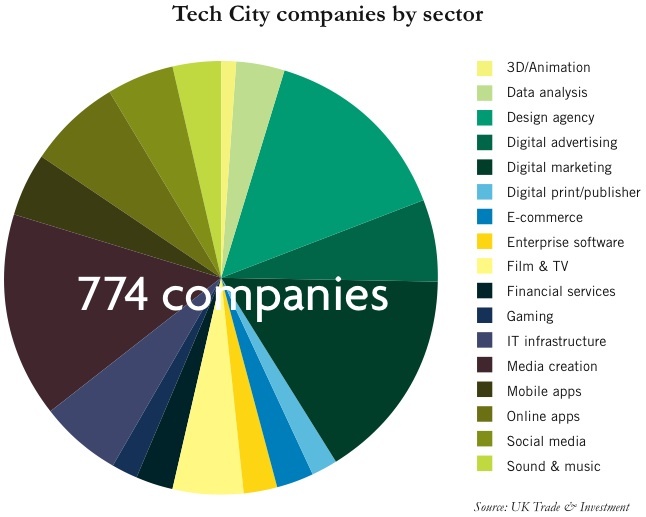It used to be a nondescript part of town, cut off from the commotion of the West End and habituated by free-spirited artists and hipsters. However, over the course of the past ten years the area around the Old Street roundabout has been reborn as Tech City, the digital media hub of the UK and some would argue Europe.
Its trendy warehouse spaces, which once housed studios and galleries, are now populated by a group of exciting technology start-ups making waves across the continent.
The area’s nickname of Silicon Roundabout may have started out as a joke, but the government has taken the area’s growth very seriously. However, Tech City businesses themselves have no illusions of rivalling Silicon Valley; instead, their hope is to create a zone that will foster creative technology companies and champion British innovation.
Over hyped
The label that the area has been saddled with doesn’t appeal to all. David Fieldhouse, co-founder of Mobile Future Group, says that he ‘hates’ the name and believes that focusing on the ‘trendy’ perception of Tech City masks the fact that businesses there are still finding it very hard to attract investment.
For Phil Cox, head of UK, Europe and Israel for Silicon Valley Bank, the key to making Tech City work is a more concerted effort to bring entrepreneurs together with investors who have the skills as well as the money to foster success. ‘Experience is invaluable – from hiring and dealing with legal matters and the protection of intellectual property, right through to controlling cash, fundraising and managing growth,’ he notes. The bank has agreed to establish a UK arm to provide financing for the technology and life sciences companies based in the hub.
Virtuous circle
Alex Saint, CEO of members’ travel club Secret Escapes, has been in the Tech City area for seven years in his current guise and through previous business Dealchecker.
Following his departure from Dealchecker through a €10 million (£8.4 million) sale to French travel company Easyvoyage and an eight month earn-out, Saint has raised seed capital and Series A funding for Secret Escapes from investors including Octopus Ventures. Since its launch in February 2011, the discount luxury holiday service has accumulated 500,000 signed-up members.
To stay ahead of the competition and move beyond traditional web-based advertising, Secret Escapes has launched a £2 million television ad campaign aimed at spreading its message. In doing so it has become one of the few Silicon Roundabout companies with a national presence.
Saint’s decision to locate the company in East London was an easy one, he says: ‘Here you have good office spaces, great technology companies and like-minded people creating an atmosphere of entrepreneurship. It’s an attractive place for people to come to work for you; it’s not too pretentious and still has some original character.’
As far as other benefits go, the much-touted networking between fellow tech companies is an element of Tech City that Saint has taken advantage of and would like to see blossom further. However, he is concerned that the increasing popularity and growth of Tech City could threaten one of its key advantages: its cost-effectiveness.
‘The moment you see it becoming too popular you are going to see entrepreneurial companies moving elsewhere as low costs attract them. We want to grow as a tech hub but not to the degree that it pushes prices up,’ Saint adds.
Bedroom to boardroom
Sports-oriented social networking site Tribesports started life in founder Steve Reid’s East London flat.
The decision to move the business away from the kitchen table and join the ranks of internet start-ups around Silicon Roundabout was motivated by the need to find appropriate developers for the company, which he describes as ‘gold-dust’ due to Tribesports’ unusual coding requirements.
The fast growth of the start-up has been aided by the experience that Reid and his management team gathered while working under the likes of Brent Hoberman at Lastminute.com and mydeco.com.
For commercial director Jenna Anians, the experience she gained in spending ‘someone else’s money’ was a great opportunity and akin to doing her own three-year MBA, she says. The time spent alongside Hoberman taught Anians how fine the line can be between a viable business concept and a product that no-one will ever want.
In the two years since its incarnation, Tribesports has netted £2 million in seed and Series A funding. Reid says that operating in Tech City has surrounded the business with a good pool of experience and knowledge, though he adds wryly that too many ‘networking evenings’ end up with a cluster of entrepreneurs competing for the attention of a lone VC.
Both Reid and Anians are excited about being part of the development of the area and, despite growing out of their current office space, are eager to stay there and make the most of what is on offer.
‘I think a lot of start-ups think that it is the Holy Grail to move to Silicon Valley, but it can be the undoing of many businesses’
Taking AIM
While most technology start-ups such as Tribesports go down the venture capital route, social media company SocialGO took the unusual step of listing itself on the Alternative Investment Market (AIM) by reversing into a cash shell two years ago.
Its last placing, which saw the company raise more than £1.3 million, valued it at a cool £15 million. CEO Alex Halliday may not quite be Mark Zuckerberg, but he does claim the distinction of having been the youngest CEO of a public company when he took the role at the age of 25, shortly after the reversal onto AIM. ‘Karen Brady of The Apprentice says she was, but she was in her thirties,’ he quips.
Halliday says the business has not outgrown its roots, and will continue to be located in Tech City. ‘It’s a great place for those starting out to rapidly get up to speed and to network,’ he remarks. ‘So if people are building a business it is probably one of the best bases to do it in.’
Despite his championing of the area, Halliday believes that the ‘magical ecosystem’ that many talk about has been slightly over-egged. He says that, contrary to popular belief, he and his team do not spend the whole day meeting up with other start-up ventures for coffee, but admits that many of his most important key business connections have been made at local networking events.
Tech City Companies by Sector

Valley vs roundabout
With three-quarters of its customers located in the US, SocialGO took the decision to set up an office in Silicon Valley, while maintaining its development base at Silicon Roundabout. However, this was not a smooth ride, and Halliday says the business has now scaled back its stateside operations.
‘It was difficult to coordinate and get those people [US employees] tuned into the atmosphere we have here and the culture. It worked to some extent, but we took the view that for the amount it cost us it wasn’t worth it,’ Halliday concedes.
‘I think a lot of start-ups believe that it is the Holy Grail to move to Silicon Valley, but it can be the undoing of many businesses. If you are clear about where you are going and know what you want to achieve then you should, but to do it half-heartedly can be a hiding to nowhere.’
Halliday says that, unlike the situation here, the competition for developers in Silicon Valley is so great that businesses end up paying double the UK rate, a state of affairs that has led to SocialGO’s growth being driven through talent in Tech City and the UK.
Earlier in its development, but residing in the same office building as SocialGO, is BookingBug, an online reservation and booking platform that was co-founded by former computer programmer Glenn Shoosmith in 2008.
Coming onto the start-up scene without any experience or contacts meant that Shoosmith had to rebuild his network and sell his business until his voice hurt.
He adds, ‘I’ve been doing this for a couple of years now and have benefited greatly from being able to go to events and speak to people who are a few years ahead and are smarter and better than me and have a lot to teach. There are some great events specifically aimed at tech founders, COOs and CEOs that go through all of the planning needed.’
Having bootstrapped the business to start with, BookingBug secured $350,000 (£222,000) from a small group of angel investors including Philip Crawford, former senior vice president at US-based computer technology company Oracle.
‘I’ve benefited greatly from being able to go to events and speak to people who are smarter and better than me and have a lot to teach’
Tech support
Shoosmith believes that it is wrong to label the Silicon Roundabout ecosystem as a ‘rival’ to Silicon Valley and that it should be seen more as a complementary force.
‘There is a need for multiple geographies around the world. We need more healthy ecosystems, not just Silicon Valley,’ he adds.
Whether or not you go along with the government’s guesstimates of the number of businesses based in Tech City (see box below), there is little doubt that East London now has a technology hub that stands comparison with others across Europe and across the Atlantic, including those that have sprung up in New York and Barcelona.
Only time will tell whether the entrepreneurial spirit that has driven Silicon Roundabout’s success so far will be matched by a readiness among venture capitalists and angel investors to face up to risk and back the future of London’s exciting new technology ecosystem.
Tech City by numbers
While former Dopplr CTO Matt Biddulph was the first to put a name to, and map the progress of, Silicon Roundabout, the years since its ‘formation’ have seen a variety of other parties attempt to attach their own identity to the project.
Depending upon your source, there are anywhere between 250 and 774 tech businesses in the Tech City area. Unsurprisingly, the government has the most positive and inflated view of progress and rate of development. Company financials website Duedil has also produced what it believes is a more realistic portrayal of the area.
The website has identified 250 ‘high-growth, technology-orientated companies’. A reported 40 per cent year-on-year rise in company incorporations in the Tech City area has been tracked, representing 76 per cent of all growth across Central London in the past year.
Of the 1,040 company directors identified among the new businesses, 30 per cent are running a business for the first time and 10 per cent are female.
Prime minister David Cameron has been fervent in his support for the area, with frequent visits to Tech City start-ups providing a backdrop for the government’s initiatives.
The government’s work has come through UK Trade & Investment’s Tech City Investment Organisation (TCIO). In mapping the area it has identified (as of 15 December 2011) 774 tech and digital creative companies in Tech City. The TCIO has also broken this figure down into 17 sub-categories including 3D and animation, data analysis, digital advertising and enterprise software (see pie chart above).
It identifies digital marketing as the leader of the pack, with 123 businesses (16 per cent) located in Tech City, and views more than half (59 per cent) as ‘creative tech’ companies such as 3D and animation designers.
Andrew Humphries, dealmaker for the TCIO, says that the organisation is Number 10’s attempt to bolster what is happening already. Its job is to encourage new businesses to base themselves in the area, stoke the interest of larger organisations such as Google and Facebook, attract investment for Tech City businesses and develop entrepreneurial skills in local schools.





